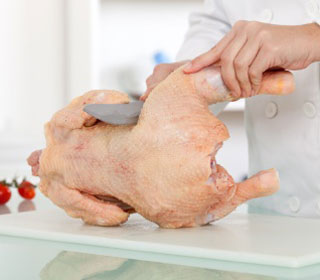Is supermarket meat healthy? The facts may shock you.
By Leah Zerbe

Sad news: That chicken could have been fed a steady diet of Prozac.
Germaphobia is in full swing. News reports of nasty microorganisms lurking on remote controls, doorknobs, and in public restrooms have many of us reaching for hand sanitizer. Sure, those tales are unappetizing, but chew on this: The real germs you need to worry about and avoid—the new-breed, potentially lethal ones—are hiding out in your grocery store’s meat aisle. So what’s the deal? Is meat healthy? Is it even safe?
Take these disturbing meat facts into account and learn to make wiser choices when you’re shopping.
Fact: American animals raised for meat eat more than 30 million pounds of antibiotics a year.
Most supermarket meat today comes from operations that routinely feed animals low doses of antibiotics. This constant contact with drugs helps bacteria learn how to outsmart the meds, creating dangerous strains of hard-to-kill superbugs.
Shopping tip: Instead of tossing supermarket meat into your cart every shopping trip, plan some meatless meals that include organic dried beans or these vegetarian protein sources. When you do eat meat, be sure to practice proper food-safety measures, no matter how the meat was produced.
Fact: Each year, food animals raised in North Carolina alone ingest more antibiotics than the entire American public.
About 80 percent of all antibiotics used in the U.S. go to nonorganic farm animals to help speed livestock growth and counteract filthy, stressful housing situations that debilitate the animals’ immune systems. The lack of accountability for the meds in industrial farming might surprise you. While people head to the doctor for a professional evaluation and prescription, anyone can walk into a farm store and buy pounds of antibiotics. The Preservation of Antibiotics for Medical Treatment Act, or PAMTA, a proposed legislation in Congress, would end the dangerous practice of feeding drugs to healthy animals, saving the medicines for when an animal is actually acutely ill and needs them.
Shopping tip: The organic seal ensures that animals were raised without the use of antibiotics or growth hormones, so go that route if you’re trying to avoid drugged meat. Animal Welfare Approved and Certified Humane® certification programs only allow giving antibiotics when an animal is actually sick…
To Continue Reading this Article Click the Link Below:
Rodale.com

Rodale.com
Posted: July 27, 2012 by Certified Humane
Is supermarket meat healthy? The facts may shock you.

By Leah Zerbe
Sad news: That chicken could have been fed a steady diet of Prozac.
Germaphobia is in full swing. News reports of nasty microorganisms lurking on remote controls, doorknobs, and in public restrooms have many of us reaching for hand sanitizer. Sure, those tales are unappetizing, but chew on this: The real germs you need to worry about and avoid—the new-breed, potentially lethal ones—are hiding out in your grocery store’s meat aisle. So what’s the deal? Is meat healthy? Is it even safe?
Take these disturbing meat facts into account and learn to make wiser choices when you’re shopping.
Fact: American animals raised for meat eat more than 30 million pounds of antibiotics a year.
Most supermarket meat today comes from operations that routinely feed animals low doses of antibiotics. This constant contact with drugs helps bacteria learn how to outsmart the meds, creating dangerous strains of hard-to-kill superbugs.
Shopping tip: Instead of tossing supermarket meat into your cart every shopping trip, plan some meatless meals that include organic dried beans or these vegetarian protein sources. When you do eat meat, be sure to practice proper food-safety measures, no matter how the meat was produced.
Fact: Each year, food animals raised in North Carolina alone ingest more antibiotics than the entire American public.
About 80 percent of all antibiotics used in the U.S. go to nonorganic farm animals to help speed livestock growth and counteract filthy, stressful housing situations that debilitate the animals’ immune systems. The lack of accountability for the meds in industrial farming might surprise you. While people head to the doctor for a professional evaluation and prescription, anyone can walk into a farm store and buy pounds of antibiotics. The Preservation of Antibiotics for Medical Treatment Act, or PAMTA, a proposed legislation in Congress, would end the dangerous practice of feeding drugs to healthy animals, saving the medicines for when an animal is actually acutely ill and needs them.
Shopping tip: The organic seal ensures that animals were raised without the use of antibiotics or growth hormones, so go that route if you’re trying to avoid drugged meat. Animal Welfare Approved and Certified Humane® certification programs only allow giving antibiotics when an animal is actually sick…
To Continue Reading this Article Click the Link Below:
Rodale.com
Category: news